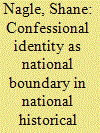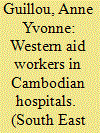| Srl | Item |
| 1 |
ID:
120012


|
|
|
|
|
| Publication |
2013.
|
| Summary/Abstract |
This article explores the question of 'boundary-formation' by examining the significance of historical narratives for defining the nation. Specifically, it compares the historical construction of religious or confessional identity as national boundary in the cases of Ireland and Germany in the nineteenth and early twentieth centuries. The article examines the importance of this historically constructed national identity for rendering continuity to the nation's history and delineating the national 'Other', thereby establishing national particularity. The historical 'joining' of 'Irishness' to Catholic identity and 'Germanness' to Protestant identity, as well as providing cultural 'cement' for the nation, also had exclusionary implications.
|
|
|
|
|
|
|
|
|
|
|
|
|
|
|
|
| 2 |
ID:
128883


|
|
|
|
|
| Publication |
2013.
|
| Summary/Abstract |
Since the Khmer Rouge genocide (1975-79), Cambodia has been constructed as a victim par excellence, which exists only through Western financial aid and compassion. In this ideological context, non-governmental organizations (NGOs) mushroomed by the hundreds in the 1980s in the refugee camps along the Cambodia-Thailand border. They then flowed into Cambodia during the repatriation process under UNHCR supervision in the early 1990s. Because of the financial weakness of the Cambodian government at that time (when support from the USSR and other socialist countries abruptly ceased), the NGOs gained a powerful position as institutional partners of the government. Taking the example of the medical sector, this article analyses humanitarian ideology and its implementation in Cambodian hospitals in the 1990s. The author explores the contradiction between the Westerners' 'philosophy of development' versus the Cambodians' 'ethic of gift', based on an ethnographical account of the daily activities in Cambodian hospitals, from an interactionist perspective. The author observes the interactions between the Cambodian staff, the humanitarian NGO staff, the patients and their families, showing how the divergence of moral values, the historical construction of the medical profession and social games create conflict between the humanitarians and the Cambodians. This has a direct impact on the patient-physician relationship. Finally, while millions of dollars and thousands of hours of humanitarian work have been spent in Cambodia, some major public health indices have not been greatly improved.
|
|
|
|
|
|
|
|
|
|
|
|
|
|
|
|